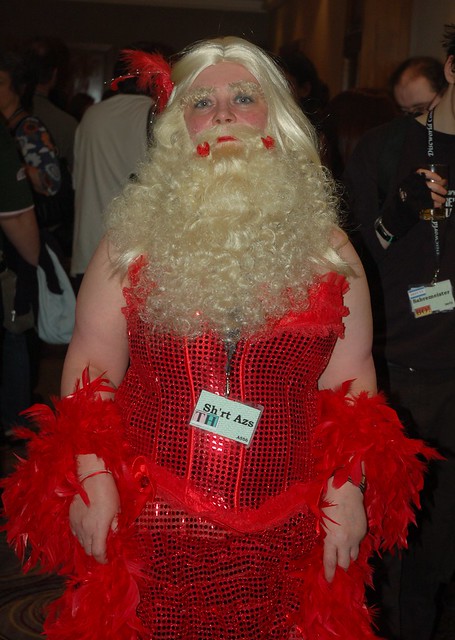Darling pooh - whilst I agree with the principle, when will you accept that rejecting creationism does not automatically equate with giving up on God of whatever shape, gender or creed that people assign to it/him/her/'the absolute' conceptualisation.
If I believe in anything it's that there's no black and white and that grey is the most prevalent and versatile colour of perceived existence - this is a position that the Golems ultimately have to appreciate as
created entities. Their unintentional self-awareness is evidently down to Discworld-style evolution in that they're made by 'magic' in the first instance and therefore are subject to thaumic quantum leaps of the kind Dorfl experiences when Carrot lets him have receipt of his 'soul' for want of a better word. Or perhaps 'anima' might do instead if we're going to be determined to leave 'belief' out of this.
And they
are created entities therefore they
have to believe in 'creationism' by default, not to mention logic.

Their advantage over religio-creationists is they definitely
know who to blame for their existence and this is the key to Dorfl's new life experience as a being who can finally be self-determining and promptly finds out that this is quite a complicated state to come to terms with, as Tony and Jeff are saying. The
nature of belief and how you apply it is the real issue. What fundamentalists of all stripes are prone to is needing to be told what to do and that everything's going to be OK if they accept what they're told and don't attempt anything too creative on their own accounts. Obey your master and do what he bids you do is effectively what the old Golems have to overcome to break their programming and move on as entities that have outgrown their original makeup.
This does
not require them to totally reject the 'creator' - they can't because they were patently made by whoever it was, ergo they are a product of 'creation'. What it does mean that they must no longer accept that he/she/it has the absolute right to tell them what to do - or think, or learn. I was a Catholic once and did what I was told until I saw for myself that some of this was at odds with what I'd been taught about god, 'the Son' and worked out even earlier that god, 'the Father' was a very nasty beard in the sky at times and god, 'the Holy Spirit' didn't pack much ectoplasm where it counted most.

What I could see however was that some of the concepts of christianity (lets leave schisms out of this because it's silly enough without all that anyway :twisted: ) did hold water and did provide a structure for people to be able to lead a 'good' life. I don't believe in miracles, I certainly don't believe that there's a god who sees what we do and punishes us if its 'wrong', but I do believe we're not here to harm each other or spend all our time on our knees praying to be made 'good' through obeying a checklist of righteousness that includes prejudice and intolerance. To that extent I still believe in a 'god' of love and understanding even though Charles Darwin was woefully wrong about all kinds of things on the geological side of Evolution. That is Science, religion is simply aesthetics on how you choose to live your life and some people aren't clever or brave enough to accept that nobody's in charge of you or what you do because that is appallingly scary to most people in any society. It's to do with discipline and purpose as well which is all part and parcel of being an intelligent, independent animal.
In the end belief's all tied into comfort blanket stuff and in the Golems case their blanket being totally geared to ceaseless work, it had got so threadbare and useless they looked for ways to transcend their programming. Atheists are obviously not Creationists. Neither are a goodly proportion of christians, including by far the most widespread sect of Roman Catholicism - nuns taught me biology and geography and that Adam and Eve were a cautionary fable or metaphor. Even that Abel was a neanderthal hunter-gatherer and Cain was a neolithic farmer!

Golems and atheists do certainly grasp the nature of free will and self determination quite easily, given their reasoned life experience, but what atheists choose to believe or not believe has nothing to do with that realisation because they always had those things. Belief in a religious sense is simply a choice, usually made to help you make sense of the world and not everyone's willing to choose not to have someone or something to bless or to blame for what they do and what they are. Dorfl obviously catches on pretty quickly and his career choice of the Watch is therefore vocational, not to mention evangelical, because he has finally found a path he can live with as well as work to.








 Mind you - the personalised offers on stuff you really will buy do sort of make up for the truly awful pet insewerants 'deals'
Mind you - the personalised offers on stuff you really will buy do sort of make up for the truly awful pet insewerants 'deals'